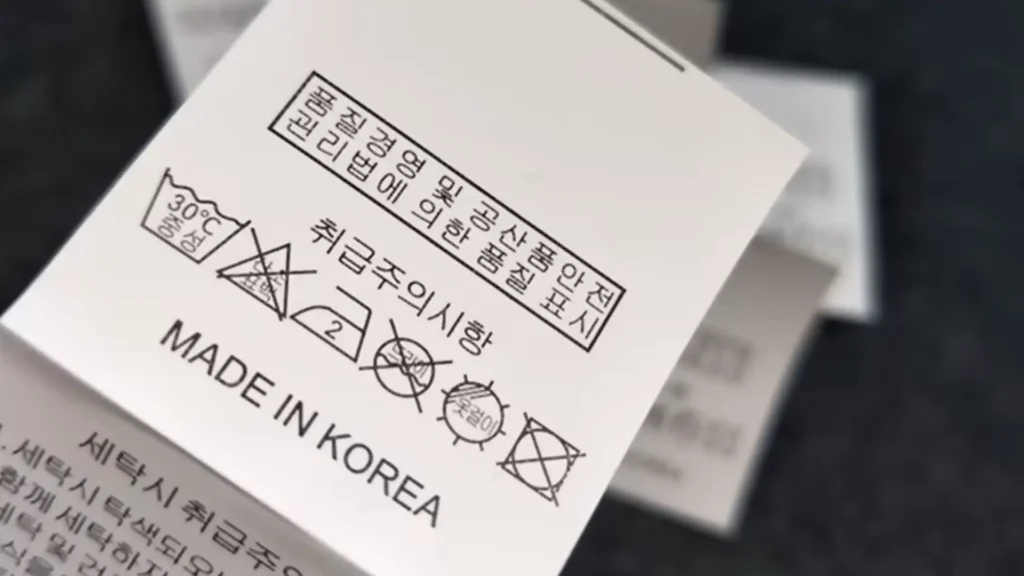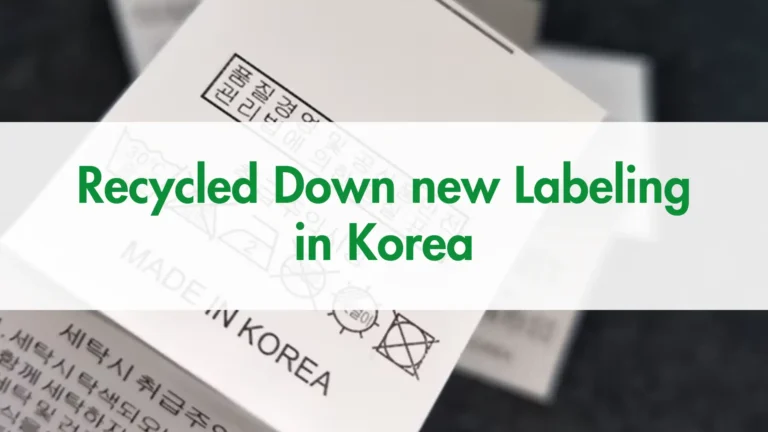Recycled Down new Labeling in Korea:
What Industry Leaders Need to Know
As sustainability becomes a core value in the global textile industry, South Korea has taken an important step in regulating the labelling of recycled down products. These new legislative changes reflect a broader shift toward environmental responsibility, transparency, and circular economy principles.
A Significant Step Toward Transparency and Sustainability

For brands in the sports and fashion industries, understanding these changes is essential—not only to ensure compliance but also to align with evolving consumer expectations for eco-friendly and responsibly sourced materials. Here’s what you need to know about this new regulation and how it will shape the future of recycled down.
Key Legislative Changes: Introduction of “Recycled Down” Labeling
One of the most impactful updates is the official recognition of “Recycled down“ as a distinct category in product labeling. Previously, regulations did not allow the identification of recycled down, limiting brands from transparently communicating their sustainability efforts.
This change supports circular fashion initiatives, allowing manufacturers to highlight the use of high-quality, recycled down in their products while promoting waste reduction and material reuse.
Expanded Labeling Requirements: Transparency for Consumers
Under the new legislation, brands must now specify when a product contains recycled down, ensuring that consumers can make informed, conscious purchasing decisions. This level of transparency strengthens consumer trust and meets the growing demand for authentic sustainability claims in the textile industry.
Simplified Product Categorization: Clarity in Down Labeling
The revised regulations simplify the way down products are categorized, helping consumers better understand product composition. The changes include:
By making product information more accessible, brands can better communicate their commitment to sustainable sourcing and responsible production.
Enhanced Quality and Safety Standards: Recycled Down on Par with New Down
A crucial element of the new legislation is ensuring that recycled down meets the same rigorous quality and safety standards as virgin down. This includes:
With these measures, brands can confidently incorporate recycled down into their collections without compromising on quality or performance.
Key updates on Korea’s
Recycled Down Regulation
Impact on the Industry:
What This Means for Brands and Consumers
Driving Innovation in Recycled Down Technologies
The introduction of recycled down labeling is a game-changer for the industry, encouraging technological advancements in down recycling. As a result, we can expect more brands to invest in high-efficiency processing methods that improve the quality and sustainability of recycled materials.
Strengthening Consumer Confidence
Clearer labeling, combined with stricter quality control, builds consumer trust in recycled down products. Transparency reassures customers that they are purchasing high-quality, environmentally responsible materials—enhancing the reputation of brands that prioritize sustainability.
Environmental Benefits: Reducing Waste in the Textile Industry
By encouraging the use of recycled down, this legislation directly contributes to reducing textile waste and supporting global efforts to combat climate change. With fewer virgin materials being extracted and processed, the industry takes another step toward a lower carbon footprint and a more circular economy.
Re:Down: Leading the Way in Sustainable Down Solutions
At Re:Down, sustainability is at the heart of what we do. We fully support these legislative changes and are proud to be at the forefront of recycled down innovation. Our advanced circular processes ensure that every batch of recycled down meets and exceeds global quality and safety standards.
As the trusted global partner for recycled down, we work closely with leading brands in the sports, outdoor, and fashion industries, helping them integrate high-performance, eco-friendly down into their collections.
Let’s Shape the Future of Circular Down Together
This shift in regulation marks an exciting opportunity for brands looking to enhance their sustainability strategies. If you’re interested in leveraging recycled down for your next collection, our team at Re:Down is here to collaborate.
Contact us to explore how we can support your brand’s sustainability journey.
Stay tuned for more updates as we continue to lead the way in circular down solutions.
Posted on 31 3 月, 2025

